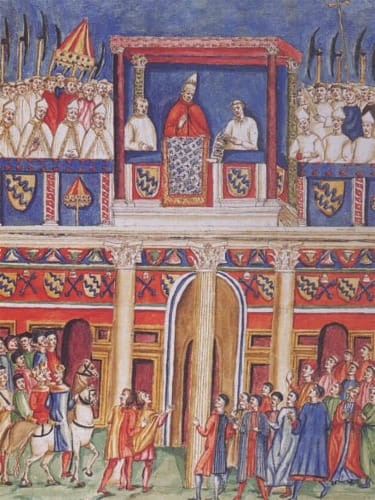Every twenty-five years the Church celebrates an Ordinary Jubilee.
On Christmas Eve, Pope Francis inaugurated the 2025 Ordinary Jubilee by opening the Holy Door of St. Peter’s Basilica in Rome. The solemn opening of the Jubilee will take place in the cathedral of each diocese on 29 December during the Mass celebrated by the bishop.
The Jubilee will end in particular churches on 28 December 2025. It will conclude across the whole Church when the pope closes the same Holy Door of St. Peter’s on 6 January 2026.
To mark the beginning of the Jubilee, this edition of Five Books for Catholics recommends three resources for the Holy Year, beginning with Pope Francis’s bull of indiction of the Ordinary Jubilee, Spes non confundit (Hope Does Not Disappoint).
Five Books for Catholics may receive a commission from qualifyng purchases made using the affliate links in this post.
To mark the beginning of the Jubilee, this edition of Five Books for Catholics recommends three resources for the Holy Year, beginning with Pope Francis’s bull of indiction of the Ordinary Jubilee, Spes non confundit (Hope Does Not Disappoint).
Papal documents take their titles from the opening words of the official Latin edition. Often, the opening words are a verse from Sacred Scripture. That is the case with Spes non confundit, whose incipit comes from Romans 5:5. That verse spells out the Christian's grounds for hope.
“Hope does not disappoint us, because God’s love has been poured into our hearts through the Holy Spirit who has been given to us.”
Romans 5:5
The opening quotation from Romans indicates three of the bull's main themes: the theological virtue of hope, God’s love for us, and the Holy Spirit’s action on our souls.
Following the cue given in the bull's incipit, Pope Francis recommends that we take Romans as our guide for this Jubilee. Indeed, the bull cites Romans far more than any other book of the bible: ten times. Following Pope Francis's advice, Romans is the second recommended resource for this Holy Year. The recently issued Ignatius Catholic Study Bible contains useful notes and commentary. The Augustine Bible is another translation that several scholars have recommended.
As the title of the bull indicates, Pope Francis exhorts us to renew our hope during the Jubilee.
“In the heart of each person, hope dwells as the desire and expectation of good things to come, despite our not knowing what the future may bring. Even so, uncertainty about the future may at times give rise to conflicting feelings, ranging from confident trust to apprehensiveness, from serenity to anxiety, from firm conviction to hesitation and doubt. Often, we come across people who are discouraged, pessimistic and cynical about the future, as if nothing could possibly bring them happiness. For all of us, may the Jubilee be an opportunity to be renewed in hope. God’s word helps us find reasons for that hope. Taking it as our guide, let us return to the message that the Apostle Paul wished to communicate to the Christians of Rome.”
(Spes non confundit, n. 1)
Christian hope is not something we can conjure up by ourself. It is a theological virtue. God is its source, object, and motive. Hence, it needs to be “constantly renewed and confirmed by the working of the Holy Spirit.” (n. 3) who “illumines all believers with the light of hope” and “keeps that light burning.” To sustain our hope, we need patience, one of the fruits of the Holy Spirit (n. 4).
Hope has it source not only in the Holy Spirit but also in Christ. As Pope Francis notes, “Hope is born of love and based on the love springing from the pierced heart of Jesus upon the cross." (n. 3). This is a discrete allusion to Devotion to the Sacred Heart. Pope Francis has encouraged and explained this devotion is his most recent encyclical, Dilexit nos.
Pope Francis exhorts us to not only cultivate hope in our life but also to be “signs of hope” for those in needs. He goes through various works of mercy by which we can give hope to various classes of person.

The Church initiated the jubilee as an way for the faithful to reconcile themselves with God. Hence, jubilees are special occasions to gain a plenary indulgence in satisfaction for the temporal punishment we deserve for our sins. To make more sense of the indulgences, temporal punishment, and satisfaction, read the post on purgatory.
The Church stipulates many ways in which the faithful can obtain an indulgence at any time whatsoever (see the Manual of Indulgences). It also establishes various ways to obtain one during a Jubilee year. For this reason, it is worth reading the decree in which the Apostolic Penitentiary specifies them. This is the third recommended resource for this year. The Catholic News Agency has also published a summary.
To gain an indulgence, it is necessary to perform a specific prescribed work. It is also necessary to fulfil four further general conditions: 1) have no attachment whatsoever to sin, even venial sin; 2) receive the sacrament of Penance; 3) receive Holy Communion: 4) pray an Our Father and a Hail Mary (or some other prayer) for the intentions of the pope. The last three conditions “may be fulfilled several days before or after the performance of the prescribed work; it is, however, fitting that Communion be received and the prayer for the intention of the Holy Father be said on the same day the work is performed”. Moreover, a “single sacramental confession suffices for gaining several plenary indulgences; but Holy Communion must be received and prayer for the intention of the Holy Father must be recited for the gaining of each plenary indulgence” (Manual of Indulgences, Norm 20).
May this Jubilee be a year of grace for each one of us.

